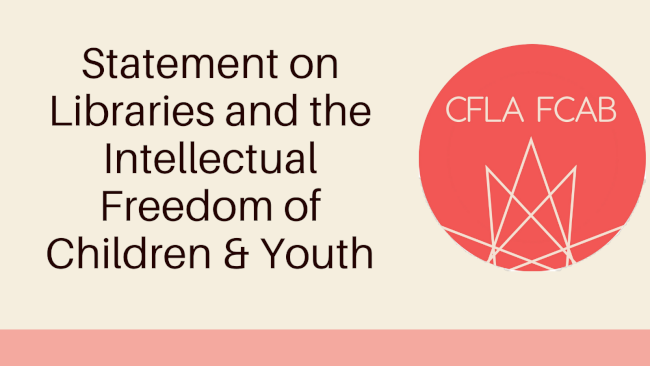
CFLA Releases Statement on Libraries and the Intellectual Freedom of Children & Youth
October 6, 2024
The Canadian Federation of Library Associations (CFLA) recently published a statement on the intellectual freedom of children and youth.
CFLA-FCAB Statement on Libraries & the Intellectual Freedom of Children & Youth
Libraries provide a wide array of services to meet the educational and recreational needs of their users. Library users of every age have their own unique sets of values, maturity levels and cognitive abilities. Libraries do not make assumptions or judgements about their users, nor do they impose arbitrary limitations upon access to library services. Minors therefore should not be restricted from accessing services on the basis of their age, and no service should be excluded on the chance that it might be accessed by minors.
Rights and Freedoms
Children and youth enjoy many of the same intellectual and expressive rights and freedoms as adults (see Appendix). Intellectual freedom is essential for children and youth to effectively explore the world of ideas; discover and pursue interests; learn skills and access information; inspire innovation; and grow in self-knowledge and empathy. Libraries respect the rights of children to access information and ideas.
All people, regardless of age, possess a right to privacy and confidentiality. Libraries respect and defend the privacy and personal autonomy of children and youth in selecting their own services.
Canada’s pluralistic society reflects a diverse range of values and perspectives. Libraries provide a wide array of services representing a broad range of topics and worldviews. Parents and guardians have the right to steward their child’s exploration of the library in a manner consistent with the evolving capacities of the child, but do not have the right to place access restrictions on other children. Library patrons may express concerns about specific library services through their library’s reconsideration process in which staff may reassess alignment with library policy.
Responsibilities
Libraries encourage parent or guardian involvement in their child’s library use. Libraries are responsible for developing diverse services that reflect multiple perspectives, community demographics, and the wider world. Library staff are not responsible for children and do not act in a parental capacity. Libraries will not restrict the access of children or youth to library services, except for those restricted by law.
Appendix: Relevant documents
- Canadian Charter of Rights and Freedoms, Section 2(a) and (b) (Constitution Act, 1982)
- CFLA-FCAB Statement on Intellectual Freedom and Libraries
- Provincial and Territorial Human Rights Codes or Acts (regarding age-based discrimination)
- United Nations Convention on the Rights of the Child, articles 12, 13 and 14 (ratified by Canada, with reservations, in 1991)
- United Nations Universal Declaration of Rights and Freedoms, articles 18 and 19 (signed by Canada in 1948)
- Chamberlain v Surrey School District 36 (SCC decision, 2002)
- S. L. v Commission scolaire des Chênes (SCC decision, 2012)
Add a new comment